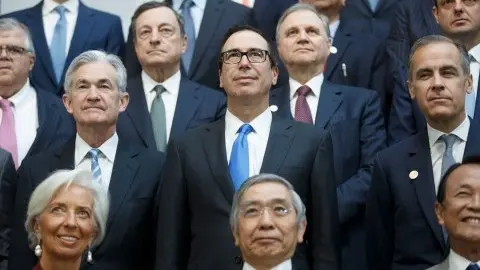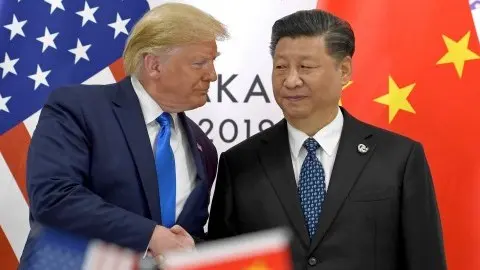July Economic Update: The Art of the Deal
Politics is increasingly driving economics, with escalating US-China trade tensions and subsequent ceasefire being a case in point. We believe a trade deal will finally be signed later this year, but not before the Federal Reserve and European Central Bank have come to the economy’s aid with monetary easing.
July Economic Update: The Art of the Deal
Politics is increasingly driving economics, with escalating US-China trade tensions and subsequent ceasefire being a case in point. We doubt the truce will hold for long and Europe could yet get dragged into the conflict over the next few months. We believe a trade deal will finally be signed later this year, but not before the Federal Reserve has come to the economy’s aid with interest rate cuts. The ECB is expected to offer stimulus of its own, and the nomination of Christine Lagarde as the bank’s new president has added to this dovish view. Moreover, the political dealmaking in Europe, now under new leadership, looks set to be ramped up as Brexit looms large.
Despite the easing of trade tensions, the Federal Reserve is clearly indicating it is prepared to offer early support to the US economy. Activity data is showing signs of softening, inflation is benign and markets are keen for action. As such, we expect precautionary 25 basis point rate cuts in both July and September.
The market continues to look for more - a third move in 4Q19 with an additional fourth cut in 1Q20. We remain more cautious given our belief that President Trump wants to be re-elected and will therefore be prepared to sign a trade deal, probably in 4Q, that doesn’t necessarily meet all of his initial demands. We assume Trump will want the optimal conditions of rising equity markets and decent economic activity going into the campaign proper, and a trade deal together with lower interest rates can deliver that.
Meanwhile, bond markets are enjoying the art of the steal. On one side of the balance sheet, core issuers are obligated to return less money than they have been lent right out to 10 years. On the other side, investors have eyed the 10yr US at 2% and concluded that that is a steal when compared with other (negative yielding) risk-free rates. Absolute yield levels are discounting all kinds of awful scenarios ahead, partly reflective of a perennial disinflation tendency, but also heavily influenced by a remarkable excess of demand over supply (which the ECB will likely augment).
The eurozone economy is still desperately seeking guidance and support. Confidence indicators have started to deteriorate again, and a rate cut is now a question of ‘when’ rather than ‘if’. It’s a close call, but barring a further deterioration in the data before the July meeting, we think the ECB is more likely to wait until September when it will have a new set of staff projections.
Concerns are growing that a new UK prime minister could pursue a ‘no deal’ Brexit, although we still think parliament would force a general election if there were no alternative way to stop it. All of this uncertainty is continuing to weigh on growth and a Bank of England rate hike this year looks unlikely.
Even after the China-US sideline meeting at the G20 in late June, it is still too early to say that the two sides are close to reaching an agreement. Technology is the big issue, but it seems to us little can be done. China needs more infrastructure investment, both for stimulus purposes and for achieving technology independence. The central bank needs to support these projects by adding more liquidity to the market. USD/CNY has been more affected by a weak dollar than the outcome of the G20.
The eight year dollar bull run is showing signs of fatigue – but is not giving up without a fight. We suspect that an escalation in trade tensions will prove the catalyst for a fresh bout of dollar losses – especially in USD/JPY.
ING global forecasts
Tags
July Economic UpdateDownload
Download report
9 July 2019
What’s happening in Australia and the rest of the world? This bundle contains 7 articles"THINK Outside" is a collection of specially commissioned content from third-party sources, such as economic think-tanks and academic institutions, that ING deems reliable and from non-research departments within ING. ING Bank N.V. ("ING") uses these sources to expand the range of opinions you can find on the THINK website. Some of these sources are not the property of or managed by ING, and therefore ING cannot always guarantee the correctness, completeness, actuality and quality of such sources, nor the availability at any given time of the data and information provided, and ING cannot accept any liability in this respect, insofar as this is permissible pursuant to the applicable laws and regulations.
This publication does not necessarily reflect the ING house view. This publication has been prepared solely for information purposes without regard to any particular user's investment objectives, financial situation, or means. The information in the publication is not an investment recommendation and it is not investment, legal or tax advice or an offer or solicitation to purchase or sell any financial instrument. Reasonable care has been taken to ensure that this publication is not untrue or misleading when published, but ING does not represent that it is accurate or complete. ING does not accept any liability for any direct, indirect or consequential loss arising from any use of this publication. Unless otherwise stated, any views, forecasts, or estimates are solely those of the author(s), as of the date of the publication and are subject to change without notice.
The distribution of this publication may be restricted by law or regulation in different jurisdictions and persons into whose possession this publication comes should inform themselves about, and observe, such restrictions.
Copyright and database rights protection exists in this report and it may not be reproduced, distributed or published by any person for any purpose without the prior express consent of ING. All rights are reserved.
ING Bank N.V. is authorised by the Dutch Central Bank and supervised by the European Central Bank (ECB), the Dutch Central Bank (DNB) and the Dutch Authority for the Financial Markets (AFM). ING Bank N.V. is incorporated in the Netherlands (Trade Register no. 33031431 Amsterdam).
